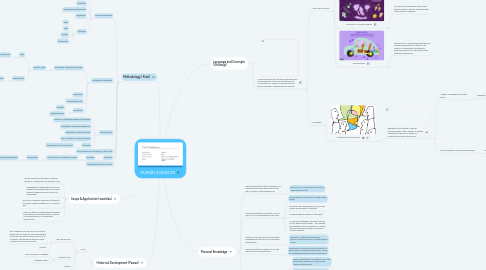
1. Methodology ( Kate)
1.1. positivist approach
1.1.1. methods
1.1.1.1. scientific
1.1.1.2. quantitative
1.1.2. objective
1.1.3. reproducible experiments
1.1.4. probability
1.1.5. outcome
1.1.5.1. truth
1.1.5.2. laws
1.1.5.3. models
1.1.5.4. predictions
1.2. interpretivist approach
1.2.1. qualitative, interpretive method
1.2.1.1. surveys, polls
1.2.1.1.1. laws
1.2.1.1.2. experiments
1.2.2. subjective
1.2.3. context important
1.2.4. outcomes
1.2.4.1. insights
1.2.4.2. understandings
1.3. critical theory
1.3.1. search for underlying patterns/ meanings
1.3.2. explanation of human behaviours
1.3.3. operation of mental process
1.3.4. role of politics in human sciences
1.3.5. outcome
1.3.5.1. explanation ( not information)
1.4. incorporation of economics, maths, data
1.5. structure
1.5.1. question
1.5.1.1. construction of method of inquiry
1.5.1.1.1. observation
1.6. connected to social sciences
2. Scope & Application (vanshika)
2.1. human sciences is the study of human nature in a systematic and scientific way
2.2. investigates an explanation for human behaviours and development, includes subjects ranging from economics to psychology
2.3. this AOK is important because it attempts to explain irrational behaviours in a rational way
2.4. there are ethical considerations regarding the methods of experimentation, such as not causing harm in a psychology experiments
3. Historical Development (Pawan)
3.1. Turns
3.1.1. The Cultural Turn
3.1.1.1. An increased focus on the role of culture within human sciences. This development took place during the 20th and early 21st Centuries, though during the early 20th Century it was less prominent.
3.1.1.2. Culture
3.1.2. Linguistic Turn
3.1.2.1. More focused on language
3.1.2.2. Language action
3.1.3. Effects
3.2. Freud
3.2.1. Came up with the theory of the subconscious
3.2.1.1. Theorised that a large part of our personality is made up of the conflict between our urges and our restraint to control these urges.
3.2.1.1.1. Believed that anxiety came about
3.2.2. Theorised that a large part of our personality is made up of the conflict between our urges and restraint to control these urges.
4. Personal Knowledge
4.1. What is the nature of the contribution of individuals you know personally to this area, in terms of your experience?
4.1.1. discussions, comments and analysis of experiments ( Kate)
4.2. What responsibilities rest upon YOU by virtue of YOUR knowledge in this area?
4.2.1. ethics related to the nature of experiments (Kate)
4.2.2. formation and maintenance of one's own morals and principles. (shivangi)
4.2.3. Following ethical guidelines. (shivangi)
4.2.4. To use my knowledge of human sciences to be a better world citizen - (for example knowledge of post-colonialism to respect the practices and mindsets of different cultural systems)
4.3. What are the implications of this area of knowledge in terms of YOUR individual perspective?
4.3.1. attempts of understanding human natures= new information, probably ethical issues
4.4. What assumptions underlie YOUR own approach to this knowledge?
4.4.1. complexity of human nature, importance of ethics when conducting experiments, desire for knowledge related to human behaviours
4.5. Consider the WOKs in relation to your experiences, how have these affected what and how you know in this AOK?
4.5.1. reason: observations of patterns on human behaviours, distinction of ethical and unethical experiments
4.5.2. emotions: unpredictable, driving force of human actions
4.5.3. faith: prevention/cause of actions, shaping of opinions
4.5.4. language: expression of notions, feelings through literature
4.5.5. memory- remembering/tracking of human behaviour and applying the findings in future studies. (shivangi)
4.5.6. Imagination- presence of . an active imagination is necessary to develop theories. (for instance psychological theories like Sigmund freud's psychoanalytic theory.) (shivangi)
5. Language and Concepts (Shivangi)
5.1. Human sciences are the study of humans and their behaviour. It involves humanities and social sciences- which include the study of human societies, relationships and culture.
5.1.1. some key concepts
5.1.1.1. The Verstehen position
5.1.1.1.1. German philosophy that suggests that human behaviour can only properly be studied when one is in the same position as a human being.
5.1.1.2. The nature VS nurture debate
5.1.1.2.1. One side of the argument claims that human nature is learned, while the other states that it is inherited.
5.1.1.3. Reductionism
5.1.1.3.1. the practice of analysing and describing a complex phenomenon in terms of its simple or fundamental constituents, especially when this is said to provide a sufficient explanation.
5.1.2. Language
5.1.2.1. Humans are social animals.
5.1.2.1.1. language is the method of human communication, either spoken or written, consisting of the use of words in a structured and conventional way.
